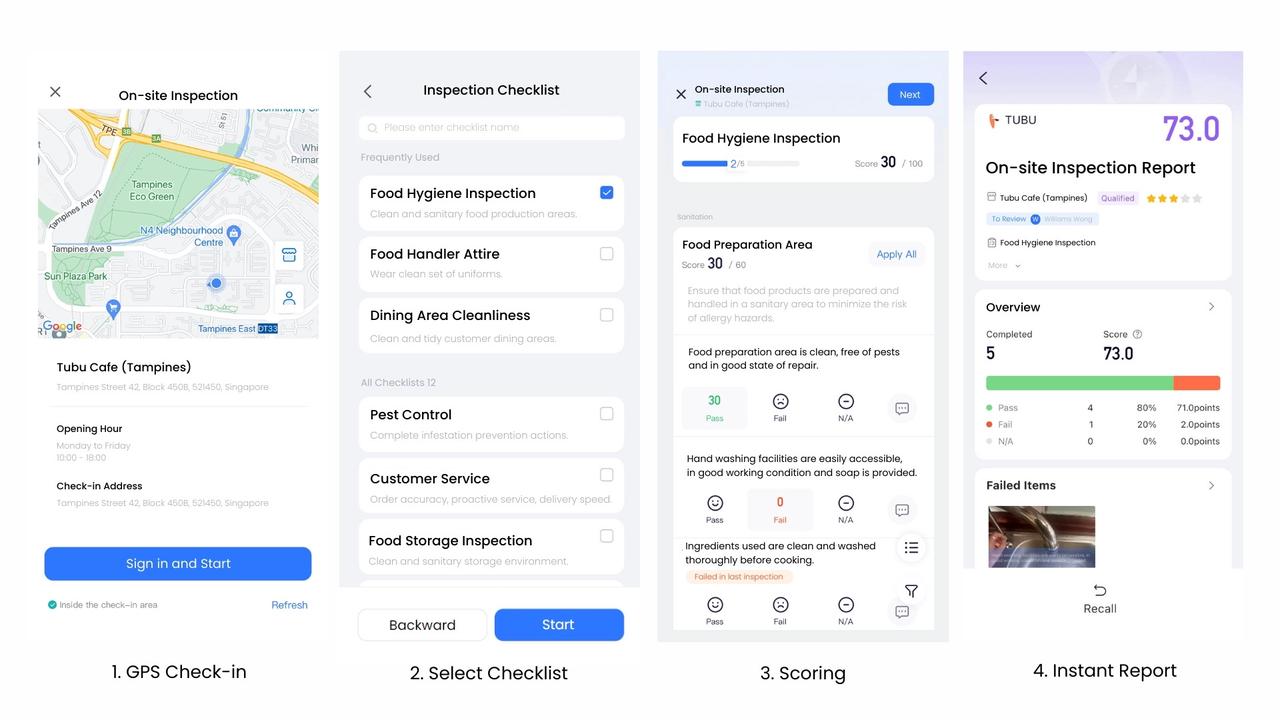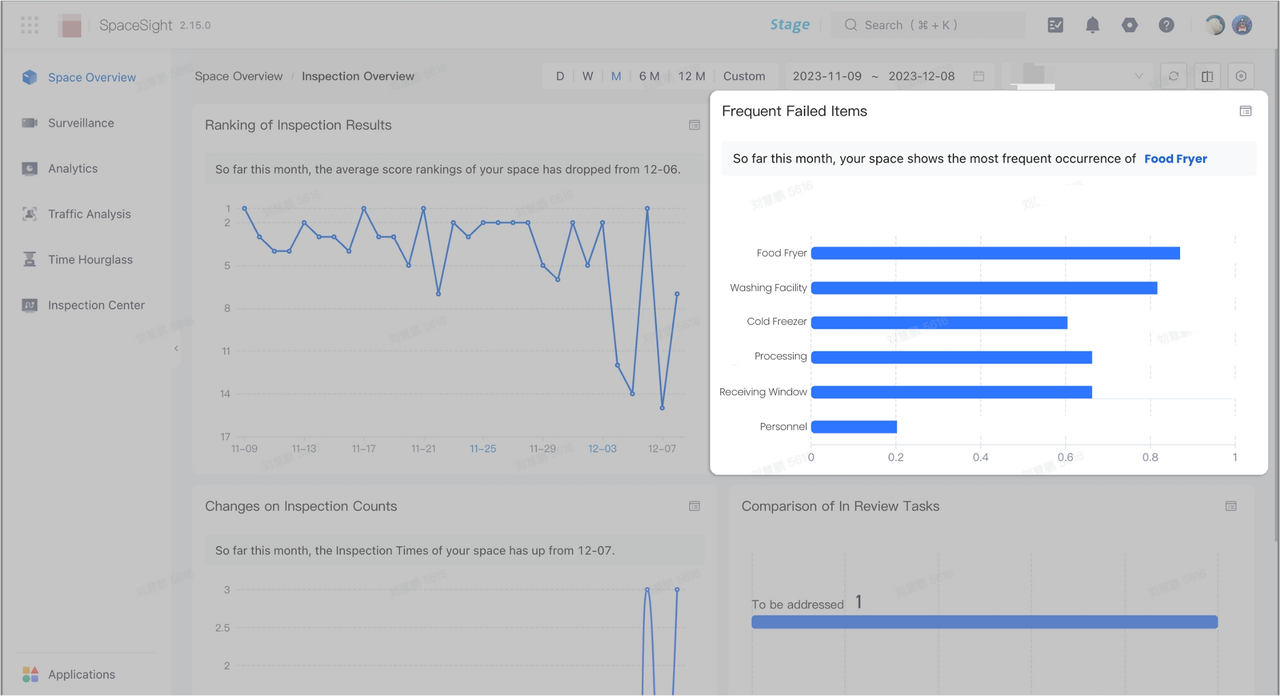Ensuring food safety is not just a legal requirement; it's a core element for business success in the F&B industry. Messing up on this front may lead to bad reviews, legal trouble, and, worst of all, losing customers. In the world of chain restaurants, where staying consistent is a must, ensuring food safety standards is even more crucial. This article outlines four essential practices for F&B managers to integrate into their daily inspection routines, ensuring robust food safety assurance in the kitchen.
It is difficult to standardize inspection protocols across locations
Standardizing inspection protocols across multiple locations is challenging with traditional methods. This inconsistency in protocols can lead to varying levels of compliance with food safety standards, posing a risk to overall brand reputation.
There are gaps between what managers see and what actually happened
The lack of real-time insights during inspections can leave restaurant managers without an immediate understanding of kitchen operations. This can create a gap between when an issue arises and when it is detected, potentially leading to an increase in food safety risks.
It is time-consuming to consolidate inspection reports
1. Using standardized inspection checklist across store inspections
The foundation of a food safety management system lies in a well-structured and standardized inspection checklist. Establishing a comprehensive checklist ensures that all relevant aspects of food safety are thoroughly examined and addressed regularly. This includes checking storage conditions, monitoring expiry dates, verifying cleanliness, and confirming adherence to food handling procedures.
2. Integrating food safety inspection into day-to-day store operations
Consistency is crucial for food safety management. Implementing recurring inspection tasks to regularly assess food safety practices helps managers proactively identify and mitigate potential hazards in the food preparation process. This approach not only minimizes the risk of contamination but also fosters a culture of vigilance and adherence to food safety protocols.
Using inspection software, managers can streamline operations by automating task assignments and configuring recurring tasks on various routines like daily, weekly, monthly, or custom schedules. This automated process significantly increases efficiency, ensuring a consistent and systematic approach to food safety and allowing for seamless integration of inspections into the regular workflow of the establishment.
3. Installing CCTV cameras in the kitchen to gain real-time insights into on-the-ground activities
The advent of technology has introduced innovative solutions for monitoring food safety. Installing CCTV cameras in kitchen areas facilitates continuous surveillance, enabling managers to oversee food preparation, storage, and handling practices. Real-time monitoring acts as a deterrent against unsafe behaviors and serves as an efficient tool for promptly identifying and rectifying potential issues, thereby enhancing transparency and accountability in the kitchen environment.
4. Utilizing the power of AI to detect food safety risks instantly
Whale SpaceSight provides robust inspection solutions for F&B brands, encompassing both online and on-site inspection options catering to restaurant operations. To date, over 400 food & beverage brands have successfully integrated Whale SpaceSight into their store operations processes, experiencing substantial improvements in operational efficiency and adherence to food safety standards.
Use SpaceSight to digitalize your inspection process
On-site store inspection has never been easier with the SpaceSight mobile app. Managers can enjoy a streamlined on-site inspection process and receive instant inspection reports. They can effortlessly upload the current checklist, applying it universally for standardized food safety protocols or customizing it for specific stores.
During the inspection, store managers or inspectors need only check at the store location and follow the checklist to examine specific items. There is no more tedious work of consolidating paper-based inspection results from various stores; this significantly saves managers' efforts in day-to-day food safety inspections and store management.

Configure inspection rules to strengthen food safety inspections
SpaceSight's website interface serves as an admin center for managers to configure inspection rules. For example, regional managers or head offices can set up recurring tasks on a daily/weekly/monthly basis to require stores to conduct regular food safety inspections.


Simultaneously, by restricting photo-proof sources to phone cameras rather than local albums, managers can guarantee the authenticity of self-inspection results, preventing the submission of outdated or falsified photos.

Gain real-time insights with AI-powered video analytics
SpaceSight offers high-resolution surveillance for the kitchen area and equips managers with 24/7 automatic detection of food safety risks. AI-powered video analytics facilitate the prompt identification of improper behaviors, including smoking, inadequate handwashing, and failure to wear a mask during food preparation—actions that could pose food safety risks. Upon detection of such events, SpaceSight promptly sends push notifications to the designated person in charge, ensuring timely issue resolution.


Understand the stores' performance on a concise inspection dashboard
SpaceSight not only generates instant inspection reports but also consolidates all inspection results on a real-time inspection dashboard. Managers can identify the most frequently failed items, assign resolution tasks, and track the status of task resolution during inspections.

Ensuring food safety to protect brand integrity requires ongoing efforts from the management team. Whale SpaceSight is a powerful tool to make management tasks smoother and more efficient. By streamlining on-site inspection processes, standardizing food safety protocols with digital checklists, and offering real-time insights through AI-powered video analytics, SpaceSight stands as a 24/7 management assistant, helping brands in their pursuit of operational excellence.
- Introduction
- Challenges
- Four Management Practices to Ensure Food Safety
- Empower Food Safety Inspection by Whale SpaceSight
- Conclusion
- Energy, Passion, and the Future of AI
- Whale Secures $60 Million to Expand its Enterprise AI Suite Globally
- Introducing Echo
- Check Out Whale's Open Space, Where AI Meets the "Lead to Win" Spirit
- How GIORGIO ARMANI Redesigned Success Metrics Across Multiple Stores
- How SpaceSight Works in Standardizing and Improving Operational Efficiency for Car Workshop
- 3 Ways to Improve Conversion Rate for the Automotive Industry
- From Browsing to Buying: Use SpaceSight to Optimize Sales Through Product Placement
- How GXG Leveraged Footfall Analytics for Smarter Employee Management
- How Supermarket Chains Improve Inspection Efficiency with Smart Technology
- Build Consistent Customer Dining Experience with SpaceSight Onsite Inspection
- Four Management Practices to Ensure Food Safety in Your Kitchen
- How SpaceSight Improved Inspection Efficiency for Chain Restaurants
- Why Retail Managers Need Inspection Software for Store Management
- How to Use Footfall Analytics to Improve Customer Service
- Navigating the Future of Retail with AI with OPPO Indonesia












 English
English
















